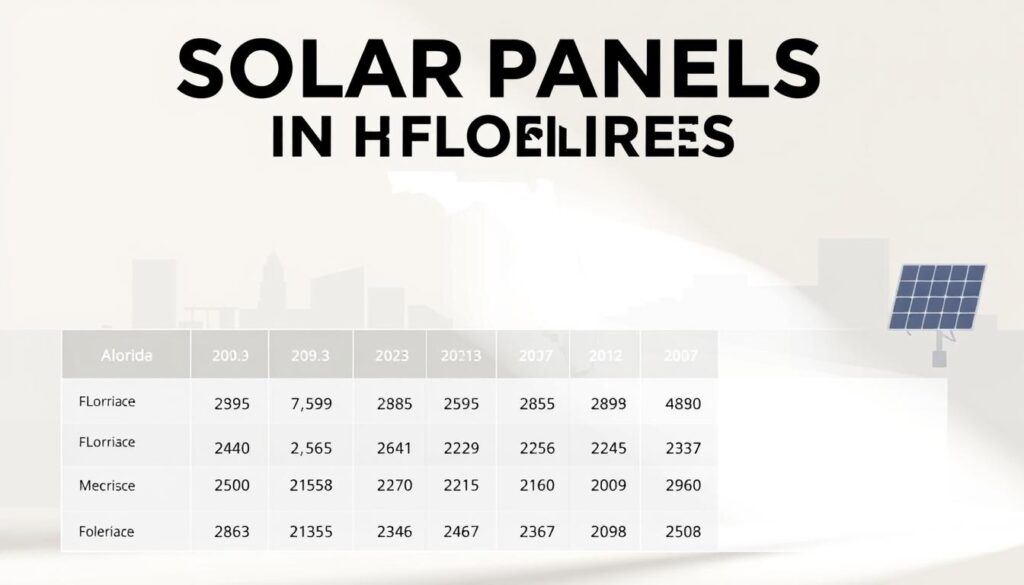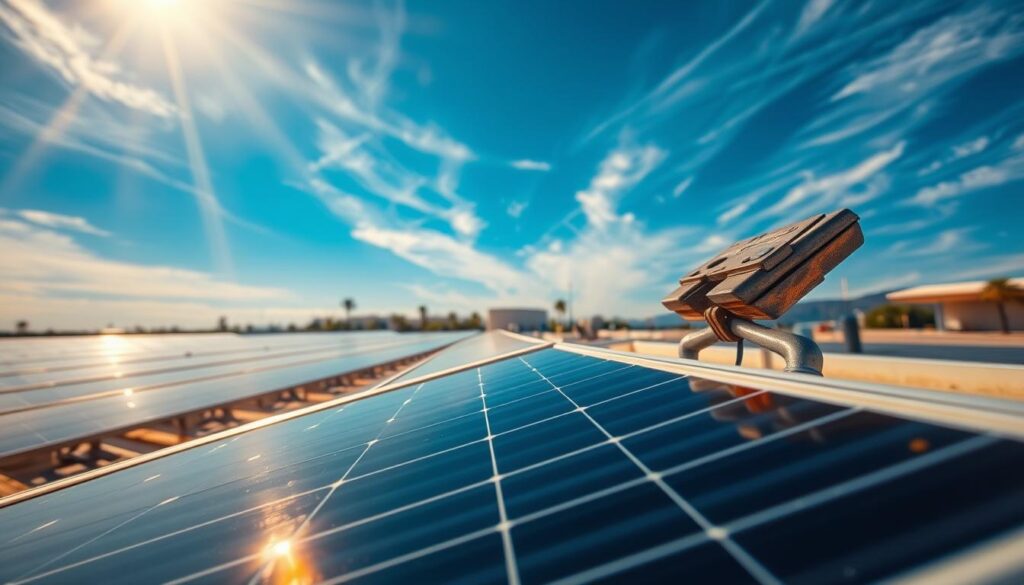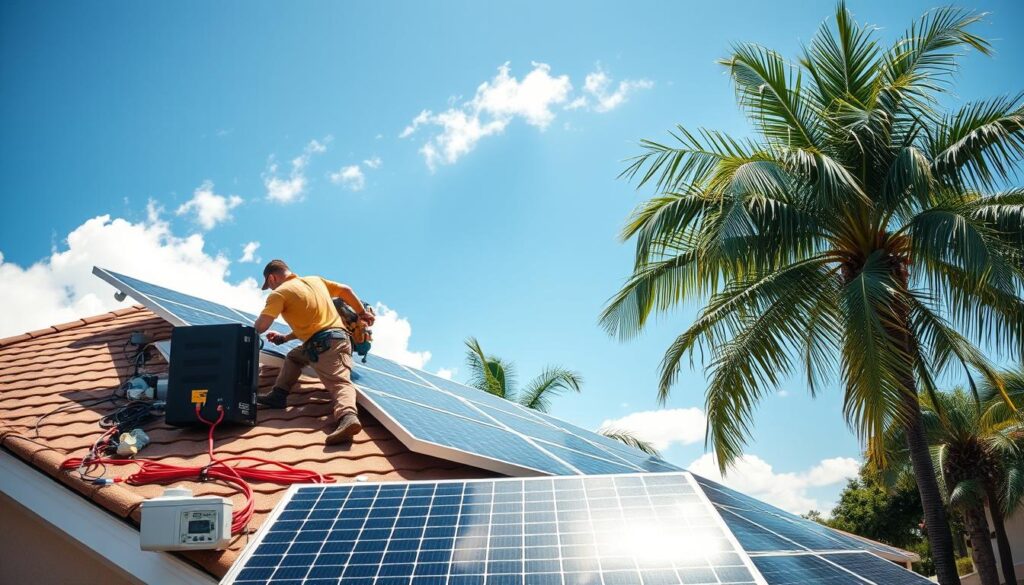Thinking about solar panels? The average price of solar panels in Florida starts at $2.11 to $2.71 per watt before incentives. A typical 11.5 kW system costs around $29,095 before tax breaks, but the 30% federal ITC cuts this to about $20,367. With 200+ sunny days yearly, Florida’s climate makes solar a smart investment. Homeowners save up to $21,632 over 25 years while cutting their carbon footprint.
Key Takeaways
- A 5 kW system costs $15,000–$25,000 pre-incentives, dropping to $10,500–$17,500 post-ITC.
- Florida ranks #3 nationally for installed solar capacity and #1 for 2023 installations.
- Post-tax-credit systems cost $8.77 per square foot for a typical home.
- Solar panels last 25–30 years, with 85–92% efficiency retained over time.
- Monthly savings on electricity bills start at $85–$215 with loan financing.
Understanding Solar Power Pricing in Florida
Florida’s florida solar panel installation costs vary widely depending on several key factors. From system size to local policies, each element shapes the final price homeowners pay. Let’s break down how these variables work together.
What Factors Influence Solar Panel Prices?
System size directly impacts costs. A 5 kW system, for example, averages $10,548 before incentives. Here’s how other factors play in:
- Roof conditions: Slope, shading, or age can add up to $2,000 in extra labor costs.
- Equipment quality: Higher-efficiency panels cost more upfront but generate more energy over time.
- Permitting fees: These account for ~3% of total costs, varying by county.
The Role of Local Incentives
Florida offers some of the best solar panel prices in florida due to state and federal programs. The federal tax credit alone cuts costs by 30%, while Florida’s sales tax exemption saves an average of $1,500. Homeowners in Sarasota or Miami also benefit from net metering policies that credit excess energy at full retail rates ($0.14/kWh).
“A 5 kW system with incentives can slash electricity bills by $69,799 over 25 years.”
Comparing quotes from Florida’s 250+ solar companies can save up to 20%. Start by checking system sizes and incentives to find the best deal.
Average Price of Solar Panels in 2023
In 2023, the average price of solar panels in florida starts at $2.11 per watt before incentives. A typical 5-kW system costs around $10,548, but prices vary widely based on panel type and location. The residential solar panel cost florida also depends on system size, with larger installations often offering lower per-watt pricing.
Monocrystalline panels lead in efficiency at 18-22%, costing $3.00–$3.50 per watt. Polycrystalline options are 10–15% cheaper but 20% less efficient. Thin-film panels offer the lowest upfront cost at $2.00–$2.50 per watt but require more roof space. Residential solar panel cost florida savings grow as systems scale, with 9-kW systems averaging $26,280 before tax credits.

Regional differences matter too. In average price of solar panels in florida comparisons, Miami averages $3.20/watt, Orlando $3.00/watt, and Jacksonville $2.85/watt. Labor costs and local competition explain these gaps. For example, Tampa’s permitting fees add 5–10% to total costs. Homeowners in rural areas may pay 15% more than urban buyers due to travel expenses.
Florida’s federal tax credit cuts costs by 30%, saving up to $6,544 on a $21,816 system. Pairing this with local rebates like Jacksonville’s $2,000 battery rebate maximizes savings. Always compare quotes from installers in your area to find the best residential solar panel cost florida deals.
Costs vs. Benefits of Solar Panels
In Florida, the solar panel cost in florida might seem high upfront, but long-term benefits outweigh initial expenses. Let’s break down how affordable solar panels florida deliver value over time.
Financial Savings Over Time
A 6kW system costs between $15,000–$21,000 before incentives. With the 30% federal tax credit, savings jump to $4,500–$6,300 immediately. Over 25 years, homeowners save up to $69,799 on utility bills. Here’s the math:
| Cost/Benefit | 6kW System |
|---|---|
| Initial Cost (after tax credit) | $10,500–$14,700 |
| 25-Year Savings | $69,799 average |
| Payback Period | 7–9 years |
Environmental Impact of Going Solar
A typical 6kW system reduces CO₂ emissions by 1,640 lbs annually. That’s like planting 20 trees yearly! Benefits also include:
- Reduced fossil fuel dependence
- Lower water usage for energy production
- Protecting Florida’s coastal ecosystems
Florida’s net metering law (since 2008) lets you earn credits for extra energy, boosting savings. Over time, these systems pay for themselves—and then keep saving.
Financial Assistance for Solar Panel Installation
Florida residents exploring affordable solar panels florida can access multiple programs to reduce upfront costs. Federal and local incentives make going solar more accessible than ever. Let’s break down how these savings work.
Federal Tax Credits for Homeowners
Claim up to 30% of installation costs through the federal Investment Tax Credit (ITC). This credit applies to all systems purchased by December 31, 2032. For a $20,000 system, this credit saves $6,000 immediately. Example: A 9-kW system costing $16,000 receives $4,800 back via this credit.
- Applies to purchases, not leases or PPAs
- Available for both new and existing homes
- Reduces federal tax liability dollar for dollar
State-Specific Rebates and Incentives
Florida adds extra savings with no state sales tax on solar equipment and property tax exemptions. Local rebates vary by city:
| City | Incentive | Max Amount |
|---|---|---|
| Jacksonville | Battery Rebate | $2,000 |
| Boynton Beach | PV Efficiency Rebate | $1,500 |
| Dunedin | Energy Production Grant | $2,500 |
| Lakeland | Battery Loan | $4,000 |
| Tallahassee | Solar Loans | $500–$20,000 |
When compare solar panel prices in florida, check local rebates first. For instance, Tallahassee loans at 5% APR lower monthly payments compared to full-price purchases. Combine these offers to cut costs by 40% or more.
Long-Term Investment: Solar Panel Lifespan
Solar panels are designed to last decades, making them a smart financial choice. When comparing the best solar panel prices in florida, longevity and efficiency should guide your decision. Over time, low maintenance and minimal replacements keep costs predictable, even as energy savings grow.

Average Lifespan of Solar Panels
Most panels come with 25-year warranties, but many operate effectively for 30–40 years. High-quality brands like SunPower or Panasonic often degrade just 0.5% yearly, retaining 80%+ efficiency after 25 years. Even with minor drops in output, they’ll keep cutting utility bills for decades.
Maintenance Costs to Consider
Regular upkeep stays affordable. Annual cleaning and checks cost $50–$100. The largest expense? Inverters, which need replacing every 10–15 years at $3,000–$6,000. Here’s the breakdown:
- Inverter replacement: 10–15 years
- Cleaning: $50–$100 yearly
- Warranty coverage: Most systems cover defects for 10+ years
While florida solar panel installation costs vary, long-term savings outweigh minor upkeep. Over 25 years, a 10kW system saves up to $40,676 in energy bills, far exceeding maintenance expenses. Choosing durable equipment and proactive care ensures your investment keeps paying off for generations.
Comparing Different Solar Companies in Florida
Shopping for solar? Florida’s market has over 250 companies, but not all offer the same value. Start by compare solar panel prices in florida to find options that fit your home’s needs. Top-rated installers like Demand Construction, Solar Optimum, and BeeGreen Solar & Roofing provide residential solar panel cost florida estimates ranging from $15,254 to $20,000 for a 5kW system. Look for companies with NABCEP certification and 5+ years of local experience.
Check pricing models: Full-service providers like Solar Optimum bundle installation and equipment, while subcontractors may split costs. Warranty terms vary too—some companies offer 10-year labor guarantees. Before choosing, review customer feedback. A 2023 survey shows homeowners rate residential solar panel cost florida companies on three factors: installation speed, warranty support, and transparency.
- Companies with over 30 reviews often have better service reliability.
- Look for 25-year product warranties on panels and inverters.
- Avoid firms without a Certified Solar Contractor (CV) license.
“We chose Solaria Solar and Roofing because their price was 15% lower than competitors, and their 24/7 support impressed us.” — Florida homeowner review, 2023
Compare quotes from at least three companies. Ask for details on subcontractor use, payment plans, and how they handle permits. Remember: the cheapest quote might lack guarantees on efficiency or labor quality. Prioritize long-term savings over upfront cost.
Understanding the Installation Process
Going solar in Florida starts with understanding the steps involved. Knowing the florida solar panel installation costs and process helps avoid surprises. Start by selecting a licensed installer familiar with local regulations to ensure compliance and efficiency.
Choosing the Right Installer
Look for installers offering transparent solar panel financing options florida and certified technicians. Ask for references and check their experience with Florida’s climate, including hurricane-resistant designs. Verify licenses via the Florida Solar Energy Industries Association (FSEIA) to confirm credentials.
- Licensing & Insurance: Confirm state-issued licenses and workers’ compensation coverage.
- Warranty Details: Compare equipment and labor warranties (typically 25+ years for panels).
- Financing Options: Discuss payment plans, leases, or loans tailored to your budget.
Typical Timeline for Installation

Installation timelines vary but usually take 1–3 months, starting with:
- Site Assessment: 1–2 weeks for roof evaluation and system sizing.
- Permitting: 1–8 weeks due to local requirements (3% of total costs). FPL service areas may have stricter rules).
- Installation: 1–3 days for panel mounting and wiring.
- Final Inspection: 1–2 weeks for utility and local authority approvals.
HOA restrictions or permitting delays can extend timelines. Installers familiar with Florida’s solar access laws can navigate these hurdles effectively.
Financing Options for Solar Panel Purchases
Choosing the right solar panel financing options florida can make affordable solar panels florida a reality. Florida residents have flexible ways to pay, from loans to leases. Let’s break down your choices.
Buying vs. Leasing Solar Panels
- Purchase: Own panels outright. Eligible for a 30% federal tax credit, lowering upfront costs. Example: A $30,000 system drops to $21,000 after the credit.
- Leasing: Pay monthly fees without ownership. No tax credits, but initial payments start at $125/month. Payments rise 2-5% yearly, reaching $240/month over 20 years.
Solar Loans and Payment Plans
Secured loans offer lower rates (5%-12%) compared to unsecured loans (up to 22%). Terms span 8–25 years. Example: A 12-year loan for $20,000 at 7% has monthly payments under $200. Over 25 years, a $30,000 loan at 8% totals $16,230 in interest but spreads payments thinner.
- PACE Financing: Loans tied to property taxes, no personal credit check required.
- 0% Down Options: Many lenders offer no upfront costs. Borrowers with FICO scores 680+ get best rates.
- Loan Savings: Even with interest, loans paired with tax credits still save homeowners up to $43,000 over 25 years.
Florida’s incentives make affordable solar panels florida achievable. Compare loan terms, credit requirements, and long-term savings to pick the best fit.
Monitoring and Managing Solar Energy Production
Maximizing the benefits of your residential solar panel cost florida investment starts with tracking energy output. Florida’s sunny climate offers ideal conditions for solar systems, but regular monitoring ensures you’re getting the most from your setup.
Tools for Tracking Solar Output
Modern systems come with real-time tracking tools. Many providers like SolarEdge or Tesla offer apps and web portals to monitor production. These tools show daily output, system health, and energy savings. For instance, an 11-kW system can offset 80-90% of a home’s energy needs when optimized. Look for systems with alerts for dips in performance to catch issues early.
Understanding Net Metering in Florida
Florida’s net metering policy credits excess energy at full retail rate, but unused credits reset yearly. Here’s how it works:
- Excess kWh generated rolls over month-to-month
- At year-end, leftover credits convert to cash at 3-5 cents/kWh
- Utilities like FPL and Duke Energy Florida have slightly different billing cycles
“Sizing systems to avoid overproduction ensures you capture most credits before the annual reset,” says the Florida Solar Energy Center.
Pairing monitoring data with net metering rules helps homeowners adjust usage patterns. For example, running appliances during peak sun hours reduces reliance on the grid. This strategy, combined with best solar panel prices in florida deals, can lower long-term costs significantly.
Future Trends in Solar Pricing
Solar energy in Florida continues evolving, with prices and technology shaping the market. As manufacturing improves and policies shift, homeowners can expect changes in the solar panel cost in florida. These shifts create new opportunities to save while adopting clean energy.
Predictions for Solar Panel Costs in the Next Decade
Rising production efficiency and federal incentives like the Inflation Reduction Act (IRA) could lower compare solar panel prices in florida further. Analysts project system costs dropping by up to 15% by 2030, driven by expanded U.S. manufacturing and tax credits. Florida’s average 11kW system, now around $20,993 after credits, may become even more affordable as supply chains stabilize. However, policy changes like net metering adjustments could affect long-term savings.
Impact of Technological Advancements on Pricing
New technologies like bifacial panels and integrated storage systems are boosting efficiency but may temporarily raise upfront costs. Still, these innovations cut energy bills faster, balancing initial expenses. Homeowners comparing options should explore models with 450W+ output, which generate more power per panel. Platforms like EnergySage help compare solar panel prices in florida to find the best deals now. As battery tech advances, hybrid systems could reduce reliance on the grid, enhancing long-term value.
With federal tax credits and state incentives still available, now is a critical time to research options. Tracking innovations and price trends ensures you secure the best deal as the industry grows toward its 2035 climate goals.
